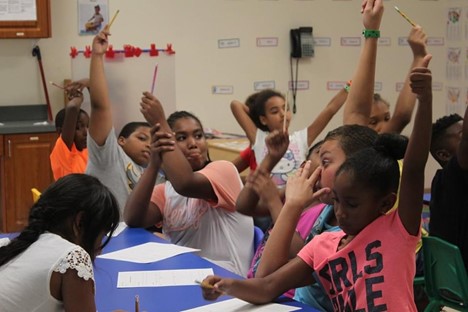Successes, Challenges & Lessons Learned: Developing a 10-week ocean science summer camp curriculum for underserved youth
 Throughout my GradEngage Fellowship, I have had the opportunity to work with iNviTECH to design and launch a 10-week ocean science summer camp curriculum for K-6 students in Durham, North Carolina. This was my first time designing educational curriculum at a large scale (i.e. 10-week, and throughout this process I learned an enormous amount about best practices in curriculum design. At the beginning of this process, I was very naive about the amount of time and effort it would take to design curriculum at a large scale. However, being a Ph.D. student at Duke gave me access to experts in the Education and Curriculum Design field through local colleges and universities, such as UNC, Meredith College, and NCCU. Ultimately, I ended up learning way more than I originally thought I would from this process and had the opportunity to translate my knowledge and expertise into engaging and interactive lesson plans to teach young students about the marine environment.
Throughout my GradEngage Fellowship, I have had the opportunity to work with iNviTECH to design and launch a 10-week ocean science summer camp curriculum for K-6 students in Durham, North Carolina. This was my first time designing educational curriculum at a large scale (i.e. 10-week, and throughout this process I learned an enormous amount about best practices in curriculum design. At the beginning of this process, I was very naive about the amount of time and effort it would take to design curriculum at a large scale. However, being a Ph.D. student at Duke gave me access to experts in the Education and Curriculum Design field through local colleges and universities, such as UNC, Meredith College, and NCCU. Ultimately, I ended up learning way more than I originally thought I would from this process and had the opportunity to translate my knowledge and expertise into engaging and interactive lesson plans to teach young students about the marine environment.
Designing the ocean science curriculum also reinforced all the ocean science knowledge I have acquired over the last 6 years, as it forced me to critically think through information and break-down complex topics and processes into digestible information for a younger audience. For years, I took marine science classes and conducted research in marine systems, however, I have very rarely taken the time to really process and analyze all the information I have acquired and how those different tokens on knowledge are connected to one another. The curriculum design process challenged me to take my knowledge and expertise and convert it into an educational story about the marine environment, rather than having a bunch of lessons on a diversity of ocean science topics without a clear relation between lessons/topics. I found outlining the “ocean science story” I wanted to tell through the curriculum the most time intensive part of this process. It took roughly 5-6 weeks to complete the outline and map out the various topics I wanted to cover in the curriculum. Once the outline was completed, creating the daily lessons was much easier and took a lot less time, because I was clear on what information needed to be covered for each lesson to effectively tell the ocean science story. Additionally, I thoroughly enjoyed creating the daily lessons, as it allowed me to be more creative and explore new interactive ways to present information to younger students.
My work with iNviTECH gave me an invaluable opportunity to create an educational curriculum for students from underrepresented backgrounds, connect with and learn from Curriculum Design experts throughout the triangle, and the ability to meaningful impact my hometown by creating a culturally relevant STEM curriculum for youth in Durham. In the future, I aspire to learn more about the curriculum design process and apply that knowledge to various aspects of my career, from teaching undergraduates to creating lessons and outreach events for K-12 students. Additionally, I plan to continue to work at iNviTECH to design other STEM-focused curriculum for various programs, such as the Track-Out camps, STEM workshops for highschoolers, and other summer camp programs. My fellowship experience has served as an informative lesson in science communication and has equipped me with new knowledge and a variety of skills to enable me to continue such work throughout my career. I hope other scientists seek opportunities to translate their knowledge and expertise to diverse audiences, as it has not only equipped me with new knowledge and skills, but also helped enhance my own understanding of various topics/concepts. Ultimately, this experience has had an enormous impact on the way I process and present information and made me a better scientist and communicator.
